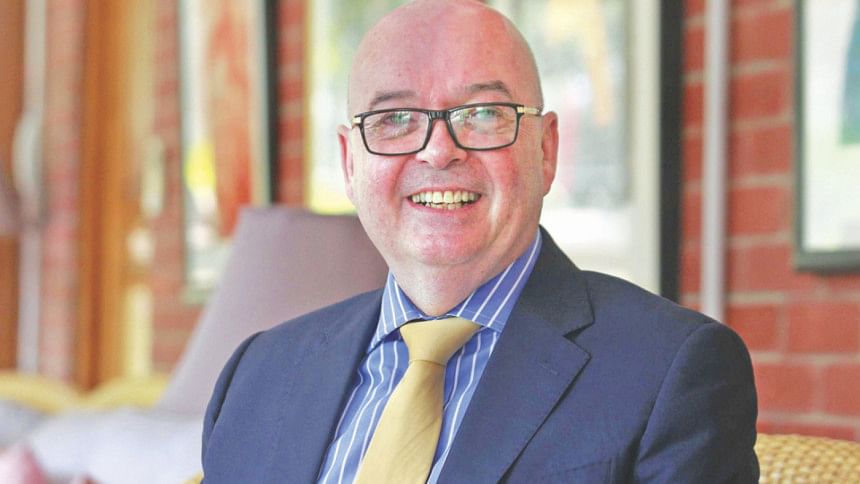Bangladesh needs to tackle security issues

Outgoing British High Commissioner in Dhaka Robert Gibson has said Bangladesh needs to come up with a “very clear strategy” recognizing the “growing challenges and threats” over security issues to ensure that Bangladesh remains a “safe place” to live and work.
“This is a worrying development,” he said in an interview with The Daily Star just a few days ahead of his departure. He leaves Dhaka this month completing his over four years of diplomatic assignment since September 2011.
The British envoy said there has been a “great change” in Bangladesh in terms of security issues though Bangladesh has a history of political violence. “…but this is the first time violence has been directed against foreign interests and we are aware that ISIL has taken responsibility for all the attacks taking place in Bangladesh.”
He thinks ISIL is probably the most well-known and certainly notorious and effective international terrorists group in the world. “We have to accept that the world we hold becomes more dangerous and more complex as the ISIL has more global ambitions and wants to create chaos and disruptions so that they can implement their extremist views.”
The diplomat having experience of working for 15 years in various capacities in Bangladesh said there is evidence that they (ISIL) want to be active in Bangladesh. “We need to address it very quickly and stop them in this country.”
On sharing credible information with Bangladesh, the British High Commissioner said they shared such info with Bangladesh but it was hard to make definite alerts. “We can just pick up indications.”
Commenting on effects of terror acts on investments in Bangladesh he, however, said they – investors - want to work in any country. “We have to manage risk. As long as security threats are managed, the investors will feel comfortable.”
Commenting on civil society and media freedom, Gibson who also served as Dean of Diplomatic Corps, said they were very “supportive” of free press and free media. “Certainly it is an essential part of democracy.”
Gibson said civil society in Bangladesh is “quite vibrant” and civil society along with the NGOs is very active at all levels.
On the upcoming local elections, the British envoy said it was important that people had power at the right level.
“I think the local elections on December 30 will be very important as the people will have the opportunity to give feedback and to make a choice,” he added.
He said the Election Commission has to make the right conditions for people to feel confident. “That's the key. Confidence has to be there.”
On the last mayoral elections in Dhaka and Chittagong, Gibson said it was frustrating on many different levels and the EC did not produce the right conditions for people to feel confident.
On alleged killings and disappearances of opposition leaders, the British High Commissioner said killings and disappearances are not acceptable in a free society. “We raise our concern as appropriate in regular basis with the government authorities.”
Responding to a question on UK's position over fresh election in Bangladesh, Gibson said UK never called for fresh election. “What we called for was parties working together to ensure future elections are more credible and participatory.
On Bangladesh's economic growth, Gibson thought the 6.5 percent growth was good but different factors “held up the development more than it should have.”
On barriers to FDI in Bangladesh, Gibson said there are two major issues and inadequate infrastructure development is one of them. “I think we all recognize that it has been slower than the ideal and government is now trying to address that.”
He said adequate electricity generation, development of roads, railways, ports are “absolutely important” if Bangladesh wanted to attract more investment.
Gibson thought that removal of bottlenecks was important “…because investors will go away if they find many bottlenecks and barriers.”
Sharing his experience in Bangladesh, Gibson said he is impressed to see the development in the rural areas. “This is a big achievement.”
Reminiscing, Gibson smiled and said, it (Dhaka) was low rise city and now Dhaka is a high rise city.
“It was fabulous experience,” is how he described his 15 years engagement in Bangladesh.
On COP21, he said it is not a case whether it will be successful but it will have to be successful.
“We must also understand that COP21 is not the end of the process. It is start of the process,” he added.

 For all latest news, follow The Daily Star's Google News channel.
For all latest news, follow The Daily Star's Google News channel. 



Comments